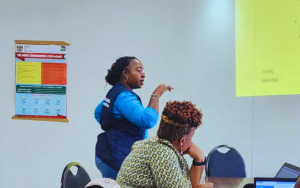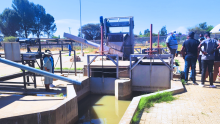WHO South Africa provides technical Support to Enhance Environmental Surveillance Expansion in the North West Province
The National Department of Health (NDOH) in South Africa, with technical support from the World Health Organization (WHO), is taking proactive measures to bolster global efforts against poliovirus transmission. Recognizing surveillance as a pivotal strategy in the fight against circulating vaccine-derived polioviruses (cVDPVs), the NDOH plans to establish new Environmental Surveillance (ES) sites in North West, KwaZulu-Natal, Mpumalanga, Limpopo, and Northern Cape provinces. This collaborative initiative, backed by WHO South Africa expertise, underscores WHO’s commitment to support South Africa's commitment to strengthening surveillance capabilities and contributing significantly to the global mission of eradicating polio.
To achieve this, from October 25 to 27, 2023, the WHO and NDOH collaborated on supporting the opening of four new ES sites, specifically two in Mafikeng and the other two in Rustenburg. This joint effort extended beyond infrastructure establishment and a comprehensive capacity-building program was conducted. During this initiative, municipal and district environmental health officers received crucial training on sample collection and transportation to the laboratory. Moreover, the program included guidance on sampling frequency and schedule, along with training on data collection tools and utilization. By aligning these objectives, South Africa, with WHO's technical support, is not only expanding its ES network but also ensuring that local health officers possess the necessary skills to execute effective surveillance, thereby advancing the shared goal of global polio eradication.
In the ongoing global effort to combat poliovirus transmission, the African region achieved wild poliovirus (WPV) certification in August 2020. Despite this milestone, the persistence of circulating vaccine-derived polioviruses (cVDPVs) necessitates urgent action. Timely detection is crucial, making surveillance a pivotal strategy to monitor eradication activities and identify poliovirus transmission. While Acute Flaccid Paralysis (AFP) surveillance remains the gold standard, supplementary systems like Environmental Surveillance (ES) significantly enhance sensitivity.
ES involves the routine collection and testing of sewage or wastewater samples contaminated with fecal matter for poliovirus presence. Proven to detect transmission even in the absence of human polio cases, ES serves as an early warning signal for disease outbreaks. The Global Polio Surveillance Action Plan (GPSAP, 2022-2024) underscores the importance of optimizing ES for polio eradication.
In South Africa, 18 ES sites are operational in five metropolitan municipalities across five provinces. However, the emergence of certain polio types in neighboring countries requires heightened surveillance along the borders, especially in areas without ES coverage. Surveillance gaps in South Africa, marked by silent and underperforming districts, prompted the NDOH to plan new ES sites in North West, KwaZulu-Natal, Mpumalanga, Limpopo, and Northern Cape provinces.





